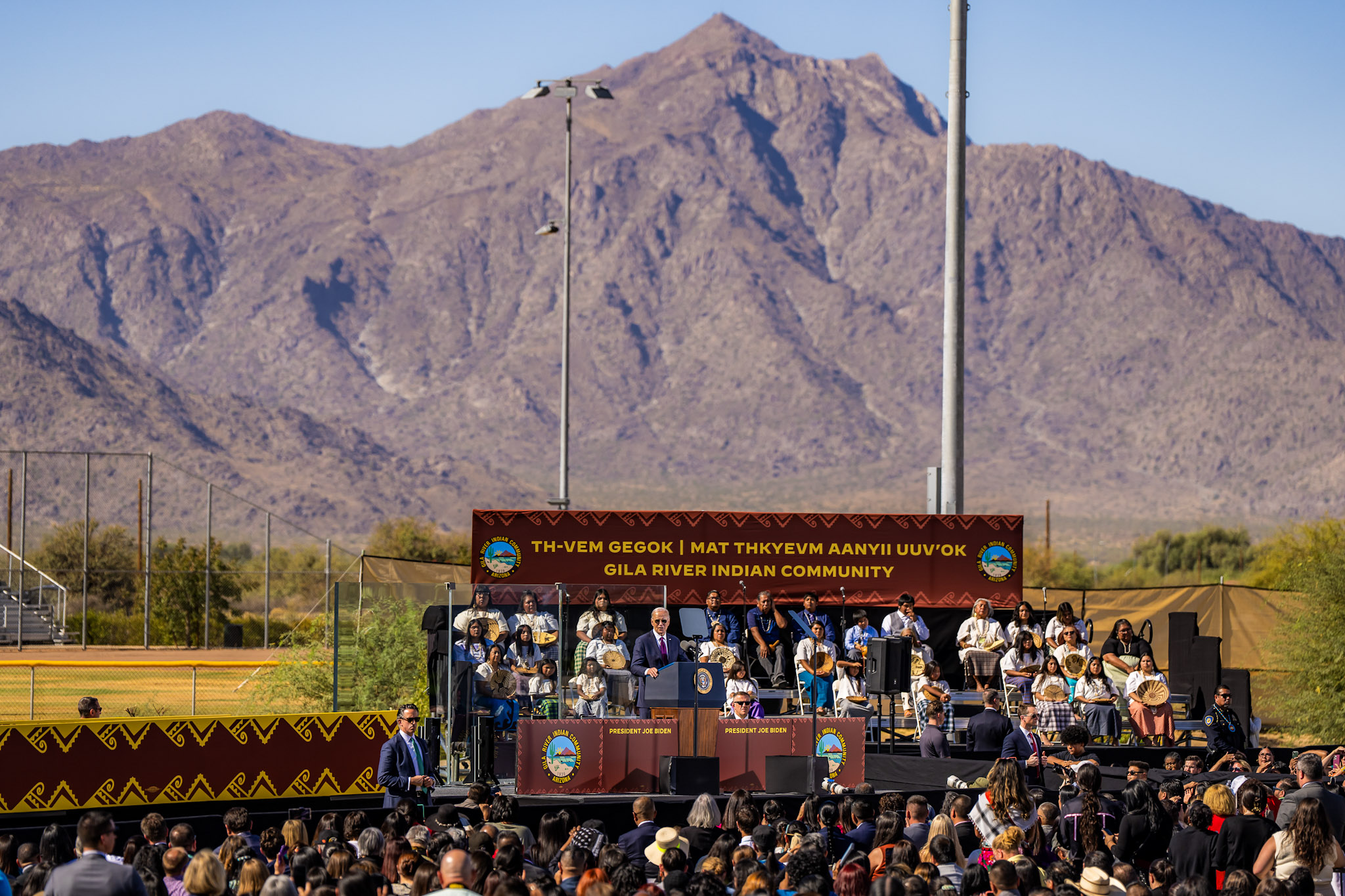Indianz.Com > News > Democracy Now: President Biden apologizes for Indian boarding school era
Biden Apologizes for Native American Boarding Schools That Aimed to Exterminate Indigenous Culture
Wednesday, October 30, 2024
In the swing state of Arizona, President Biden formally apologized Friday for U.S. government-run Native American boarding schools, which sought to exterminate Indigenous culture by forcibly removing children from their families and placing them in institutions where their languages and customs were suppressed.
“If the Democrats want the vote of Indian people, we want them to stand with us, not only on issues like the apology around boarding schools, but we also want them to stand with us in the solidarity that we have calling for a ceasefire in Palestine,” says Nick Tilsen, founder and CEO of the Indigenous-led NDN Collective.
He says that while Biden’s apology could be the start of an “era of repair” between Indigenous peoples and the U.S. government, the apology must be followed by action. Among the NDN Collective’s demands is major investment in preserving Indigenous languages, the rescinding of military honors for U.S. soldiers who took part in the 1890 Wounded Knee Massacre and clemency for imprisoned activist Leonard Peltier.
“America’s longest-living Indigenous political prisoner, who’s incarcerated right now at the age of 80 years old in a maximum-security prison, is actually a boarding school survivor,” Tilsen says of Peltier.
Transcript: Provided by Democracy Now!
AMY GOODMAN: This is Democracy Now!, democracynow.org. I’m Amy Goodman.
President Biden has formally apologized for government-run Native American boarding schools, which separated Indigenous families and sought to exterminate Indigenous culture. He’s the first U.S. president to ever do so. Biden issued the apology Friday while visiting the Gila River Indian Community in Arizona, where Democrats are vying for the support of Native communities, a crucial voting bloc that could swing the results of next week’s election. This was Biden’s first diplomatic visit to a tribal nation in his four-year term. He spoke for a few seconds before he was interrupted by an Indigenous protester.
PRESIDENT JOE BIDEN: The federal Indian boarding school policy and the pain it has caused will always be a significant mark of shame, a blot on American history. For too long this all happened, with virtually no public attention, not written about in our history books —
PROTESTER: Yeah, what about the people in Gaza?
PRESIDENT JOE BIDEN: — not taught in our schools.
AUDIENCE MEMBER: Hey, get out of here!
PRESIDENT JOE BIDEN: Let her talk. Let her talk.
PROTESTER: [inaudible] every promise for our people. How can you apologize for a genocide while committing a genocide in Palestine? Free Palestine! Free Palestine!
AUDIENCE MEMBER: Get out of here!
PRESIDENT JOE BIDEN: No, no, let her go. There’s a lot of innocent people being killed. There’s a lot of innocent people being killed, and it has to stop.
AMY GOODMAN: The U.S. government operated hundreds of boarding schools from 1819 to 1969 where children reported horrific physical, sexual and psychological abuse. An Interior Department investigation this year found nearly a thousand Indigenous children died while at these schools. Biden was joined Friday by Interior Secretary Deb Haaland, the first-ever Native American cabinet secretary, member of the Pueblo of Laguna whose grandparents were forced to attend boarding schools.
INTERIOR SECRETARY DEB HAALAND: Tens of thousands of Indigenous children as young as 4 years old were taken from their families and communities and forced into boarding schools run by the U.S. government and religious institutions. These federal Indian boarding schools have impacted every Indigenous person I know. Some are survivors. Some are descendants. But we all carry the trauma that these policies and these places inflicted.

Search
Filed Under
Tags
More Headlines
Native America Calling: Mental health experts point to personal connections to maintain winter mental health
Native America Calling: Tribes ponder blood quantum alternative
Defense bill snubs Indian Country in favor of Lumbee federal recognition
NAFOA: 5 Things You Need to Know this Week (December 8, 2025)
Chuck Hoskin: Cherokee Nation benefits from extension of health care credits
Native America Calling: Tribal museums reflect on tumultuous year, chart their next steps
Press Release: National Museum of the American Indian hosts Native art market
AUDIO: Sea Lion Predation in the Pacific Northwest
Native America Calling: Tribal colleges see an uncertain federal funding road ahead
Native America Calling: Short films taking on big stories
Native America Calling: Advocates push back against new obstacles to Missing and Murdered Indigenous Relatives momentum
Native America Calling: For all its promise, AI is a potential threat to culture
NAFOA: 5 Things You Need to Know this Week (November 24, 2025)
Chuck Hoskin: Cherokee Nation invests in rural transportation
Native America Calling: Native candidates make strides in local elections
More Headlines
Native America Calling: Tribes ponder blood quantum alternative
Defense bill snubs Indian Country in favor of Lumbee federal recognition
NAFOA: 5 Things You Need to Know this Week (December 8, 2025)
Chuck Hoskin: Cherokee Nation benefits from extension of health care credits
Native America Calling: Tribal museums reflect on tumultuous year, chart their next steps
Press Release: National Museum of the American Indian hosts Native art market
AUDIO: Sea Lion Predation in the Pacific Northwest
Native America Calling: Tribal colleges see an uncertain federal funding road ahead
Native America Calling: Short films taking on big stories
Native America Calling: Advocates push back against new obstacles to Missing and Murdered Indigenous Relatives momentum
Native America Calling: For all its promise, AI is a potential threat to culture
NAFOA: 5 Things You Need to Know this Week (November 24, 2025)
Chuck Hoskin: Cherokee Nation invests in rural transportation
Native America Calling: Native candidates make strides in local elections
More Headlines
